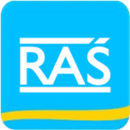Silesian Autonomy Movement Ruch Autonomii Śląska Ruch Autōnōmije Ślōnska | |
|---|---|
| Abbreviation | RAŚ[1] |
| Leader | Jerzy Gorzelik |
| Founded | January 1990 (organisation) 27 June 2001 (voluntary association) |
| Headquarters | Plac Wolności 7, 44-200 Rybnik |
| Membership (2010) | ~7,000[2] |
| Ideology | Economic progressivism[3] Silesian autonomism[4] Silesian regionalism[4] Left-wing populism[5] |
| Political position | Left-wing[3][6] |
| Religion | Roman Catholic[7] |
| National affiliation | Civic Coalition (2019) |
| Regional affiliation | Silesian Regional Party |
| European affiliation | European Free Alliance |
| International affiliation | European Free Alliance |
| Colours | Cerulean Blue Gold |
| Silesian Regional Assembly | 0 / 45 |
| Opole Regional Assembly | 0 / 30 |
| Party flag | |
 | |
| Website | |
| http://autonomia.pl | |
 Old logo of the party from 2018.[8] | |
The Silesian Autonomy Movement (Silesian: Ruch Autōnōmije Ślōnska, Polish: Ruch Autonomii Śląska, German: Bewegung für die Autonomie Schlesiens[9]), abbreviated as RAŚ, is a movement that seeks the restoration of interwar Silesian autonomy - including a separate Silesian Treasury, a Silesian Parliament, as well as a Silesian constitution and an elected president. The party envisions an autonomous Silesia either within Poland,[10] or as part of the Europe of 100 Flags, where the competences and sovereignty of modern states will be transferred to the regions.[2] RAŚ considers Silesians a separate nation and promotes Silesian nationalism.[10] The party supports regionalist and separatist movements in Europe,[11] and has also been described as separatist itself.[12][13]
The association was founded in January 1990 by Rudolf Kołodziejczyk and is based in the Polish part of Upper Silesia. On 17 October 2009, the Silesian Autonomy Movement signed a cooperation agreement with its German sister organisation, Initiative der Autonomie Schlesiens (IAS), based in Würzburg, and the UK-based Silesian Autonomy Movement. In 2002, RAŚ became a member of the European Free Alliance. In 2007, RAŚ activists reestablished football club 1. FC Katowice. Also, since 2007 RAŚ has organized annual "Autonomy Marches" in Poland (pl, szl).
Nationally, the party is considered left-wing,[3] and it is affiliated with Civic Coalition. In 2019, the RAŚ signed an agreement with the Civic Coalition for elections to the Sejm and Senate, in which both parties ran on a joint list in Upper Silesia.[14] The two parties continued to cooperate afterwards, and the secretary of RAŚ, Jacek Tomaszewski, is also a member of the Civic Coalition.[15]
- ^ Allen, Irma Kinga (2021). Dirty Coal: Industrial Populism as Purification in Poland’s Mining Heartland. History of Science, Technology and Environment. Stockholm: KTH Royal Institute of Technology. p. 100. doi:10.13140/RG.2.2.27689.67687. ISBN 978-91-7873-964-6.
As a result movements, such as the Silesian Autonomy Movement, or Ruch Autonomii Sląska, RAŚ, emerged with some success.
- ^ a b Kawęcki, Krzysztof (2012). "Idea autonomii w koncepcjach Ruchu Autonomii Śląska". Społeczeństwo i Edukacja (in Polish). 1. Międzynarodowe Studia Humanistyczne: 417–425.
- ^ a b c Newth, George (2021). "Populism and nativism in contemporary regionalist and nationalist politics: A minimalist framework for ideologically opposed parties". Politics. 44 (1). SagePub: 6. doi:10.1177/0263395721995016.
Masetti (2020) has examined 'neither left nor right' and 'left wing regionalist populism' of Plaid Cymru and the SNP, Solska (2020) has opted for the term 'progressive regionalist populism' to examine of the left-wing Silesian Autonomy Movement.
- ^ a b Cite error: The named reference
Politologicawas invoked but never defined (see the help page). - ^ Allen, Irma Kinga (2021). Dirty Coal: Industrial Populism as Purification in Poland’s Mining Heartland. History of Science, Technology and Environment. Stockholm: KTH Royal Institute of Technology. p. 102. doi:10.13140/RG.2.2.27689.67687. ISBN 978-91-7873-964-6.
Magdalena Solska (2020) outlines how two kinds of populism exist in Silesia – a left-wing progressive regionalist variant, and a right-wing national conservative kind (echoing the historic division between the 'chadecja' and 'sanacja' narratives of Silesia mentioned earlier) – the type this thesis is concerned with. While the former is represented by the Silesian Autonomy Movement, the latter is represented by PiS's style of politics.
- ^ Heinisch, Reinhard [in German]; Massetti, Emanuele; Mazzoleni, Oscar (2020). The People and the Nation: Populism and Ethno-Territorial Politics in Europe (1st ed.). Exeter: Routledge. p. 13. ISBN 978-1-351-26556-0.
The case of the Silesian Autonomy Movement (RAŚ) in Poland, and its offshoot, the recently created Silesian Regional Party (ŚPR), is analyzed by Magdalena Solska. (...) The latter are all regionalist and mainstream leftwing parties (Plaid, SNP, ERC, RAŚ).
- ^ "Takie były początki organizacji autonomistów..." enowiny.pl (in Polish). 26 February 2015.
- ^ Gehring, Kai; Schneider, Stephan A. (November 2018). "Regional Resources and Democratic Secessionism" (PDF). CESifo Working Papers (7336). Munich Society for the Promotion of Economic Research ‐ CESifo GmbH: 34. ISSN 2364-1428.
- ^ Smolorz, Dawid (23 July 2020). "100 Jahre Autonomie der Wojewodschaft Schlesien". Silesia News (in German).
- ^ a b Ślenzok, Norbert (2019). "Śląski nacjonalizm? Myśl polityczna Ruchu Autonomii Śląska" (PDF). Wrocławskie Studia Erazmiańskie (in Polish). 13. Uniwersytet Wrocławski: 249–268. doi:10.34616/wse.2019.13.249.268.
- ^ Cite error: The named reference
ruchywas invoked but never defined (see the help page). - ^ Karnowski, Michał (8 October 2017). "To dobrze, że wszyscy już widzą, jakie niebezpieczeństwo niesie separatyzm RAŚ. Ale to za mało. Państwo musi działać". W Polityce (in Polish).
- ^ Kawęcki, Krzysztof (25 January 2018). "Samorząd czy separatyzm?". Nasz Dziennik (in Polish).
- ^ "Śląskie Porozumienie Wyborcze nawiązuje współpracę z Koalicją Obywatelską. Śląski wyborca musi mieć pewność, że głos na regionalistów nie będzie głosem zmarnowanym" (in Polish). 8 October 2019.
- ^ Jedlecki, Przemysław (5 November 2021). "Sekretarz RAŚ zapisał się do PO. Czy to już koniec śląskich autonomistów?" (in Polish).